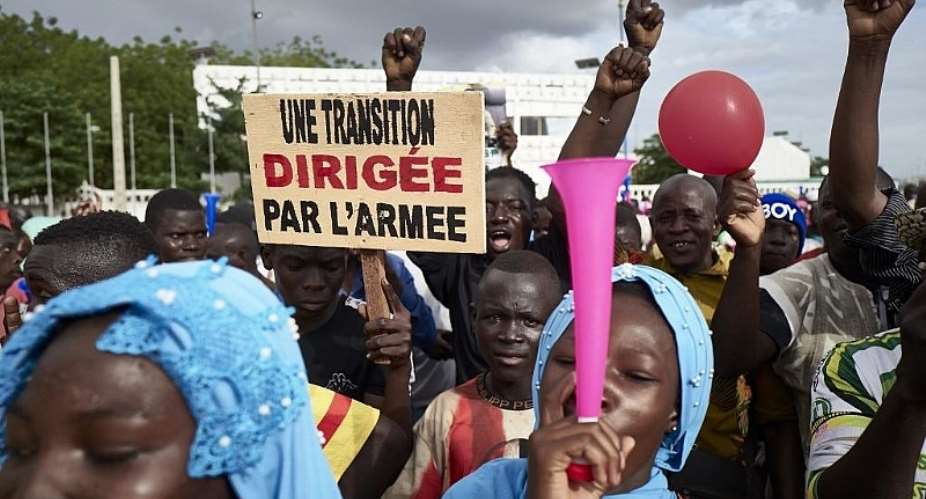Talks to steer Mali's transition to civilian rule kick off on Thursday amid intense pressure on the country's military leaders to hand over power quickly. But a former minister has said a rushed transition will create further instability.
Hours before Mali's new military leaders were due to hold national talks on Thursday to map out the country's transition, hundreds of Malians took to the streets of Bamako to pledge their support to the junta, many appealing to them to stay in power for as long as it takes.
"Why not for three years, until the end of former president IBK's mandate," a shop owner named Hamza Sangare told AFP, in reference to Mali's ousted leader.
The timeline for Mali's transition to civilian rule has become a bone of contention between the National Committee for the Salvation of the People (CNSP), as the junta is known, and the heads of state of neighbouring countries.
On Monday, West African regional bloc Ecowas gave the coup leaders a 15 September deadline to appoint a civilian to head a transition government.
The 15-nation body, which slapped sanctions on Mali following the 18 August coup, has called for elections within 12 months.
Give us time
That may be too soon.
"Should we not allow ourselves time to start over properly ?" asks Hamed Sow, Mali's former minister of energy and mines.
A lengthy transition however is a luxury that former colonial power France can afford, as Paris still reels from the killing of two French soldiers in northern Mali.
"I recall that in 2013, the government of President François Hollande wanted to hold elections in July," Sow, who was in office from 2007-2009, told RFI on the line from Bamako.
"That left little time for new parties to get organised and the traditional players were the ones who came up on top."
The 2013 election brought the now ousted president Ibrahim Boubacar Keita to power, sowing the seeds for today's coup d'état, according to Sow.
Before new elections, the former minister says Mali's problems must first be fixed, starting with the country's electoral register.
Fragile peace
"If you look at the security situation, large parts of the country are no longer under government control, while schools and hospitals remain closed," he says.
Despite a 2015 peace deal between the government and rebel groups in the north, many of its provisions, such as integrating former armed group members in the national army and carrying out a decentralization process, have not been implemented.
"Mali signed these accords under immense pressure from the international community and few Malians actually support it," explains Sow, who wants the deal to be reviewed.
He also wants audits to be carried out on government procurement contracts and public services to stamp out corruption.
"If we don't carry out these reforms, the same problems will come back to bite us."
Last chance
What is Sow expecting from Thursday's national transition talks between the junta and opposition groups ?
"We must be clear about our objectives and the kind of state we want to return," he says.
On that score, there is no time to lose.
"All Malians either at home or abroad are galvanized," he comments.
"Everyone has said this is our final chance."
Mali has experienced four coups since its independence 60 years ago. Few can tolerate further instability.
"If we get the transition wrong, we risk seeing the Somalisation of Mali," warns Sow, depicting a country with a failed state and multiple factions.
"The international community must support us, but at the same time allow Malians room to find their own way out."





 Akufo-Addo commissions Phase II of Kaleo solar power plant
Akufo-Addo commissions Phase II of Kaleo solar power plant
 NDC panics over Bawumia’s visit to Pope Francis
NDC panics over Bawumia’s visit to Pope Francis
 EC blasts Mahama over “false” claims on recruitment of Returning Officers
EC blasts Mahama over “false” claims on recruitment of Returning Officers
 Lands Minister gives ultimatum to Future Global Resources to revamp Prestea/Bogo...
Lands Minister gives ultimatum to Future Global Resources to revamp Prestea/Bogo...
 Wa Naa appeals to Akufo-Addo to audit state lands in Wa
Wa Naa appeals to Akufo-Addo to audit state lands in Wa
 Prof Opoku-Agyemang misunderstood Bawumia’s ‘driver mate’ analogy – Miracles Abo...
Prof Opoku-Agyemang misunderstood Bawumia’s ‘driver mate’ analogy – Miracles Abo...
 EU confident Ghana will not sign Anti-LGBTQI Bill
EU confident Ghana will not sign Anti-LGBTQI Bill
 Suspend implementation of Planting for Food and Jobs for 2024 - Stakeholders
Suspend implementation of Planting for Food and Jobs for 2024 - Stakeholders
 Tema West Municipal Assembly gets Ghana's First Female Aircraft Marshaller as ne...
Tema West Municipal Assembly gets Ghana's First Female Aircraft Marshaller as ne...
 Dumsor is affecting us double, release timetable – Disability Federation to ECG
Dumsor is affecting us double, release timetable – Disability Federation to ECG
